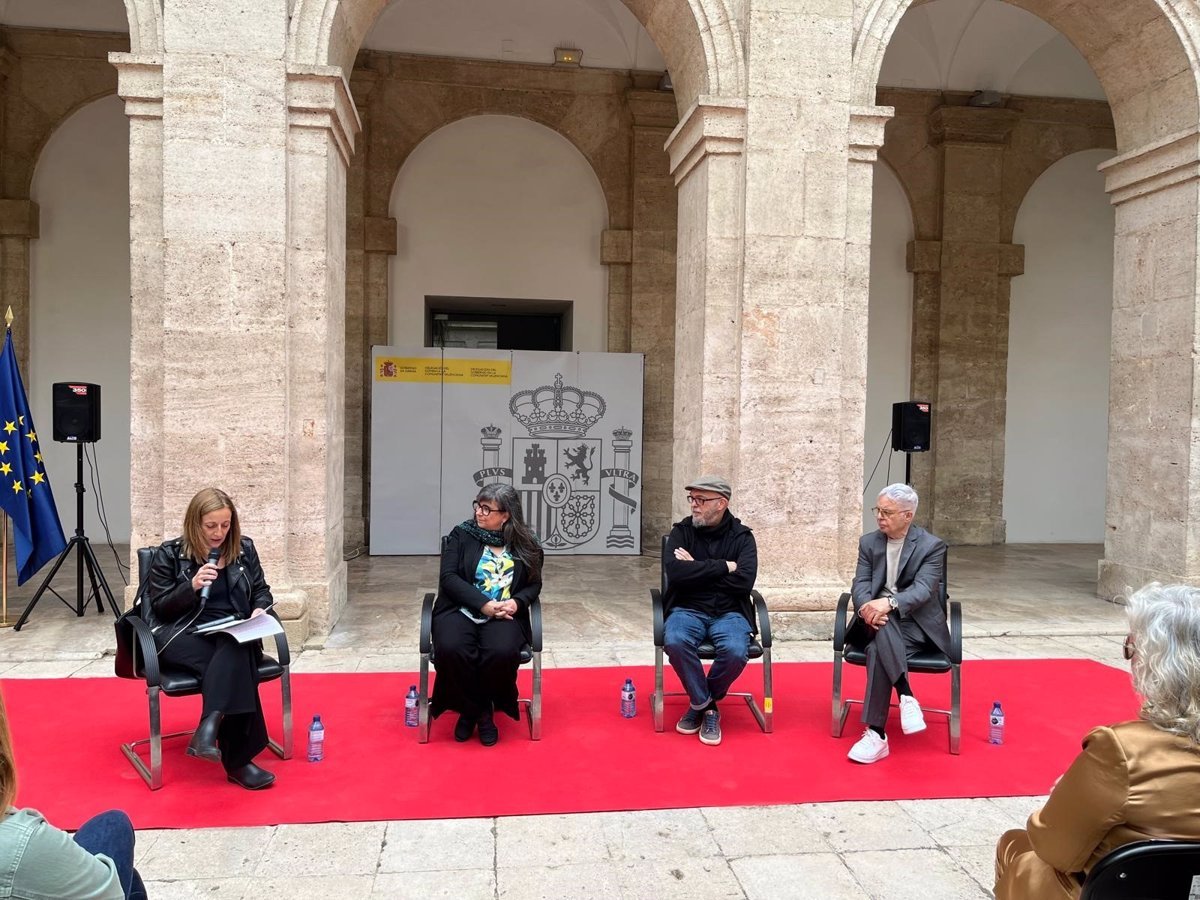The Government allocates over four million to support the cultural sector affected by the dana
Cultural creators affected by the dana have highlighted culture as a way to «make people reflect on what has happened» in the floods and have praised that culture «is healing for creators, but also for society and the affected individuals»
This was emphasized on Wednesday by graphic artist Cristina Durán and screenwriter Miguel Ángel Giner, who participated in the event ‘Authors affected by the dana’, organized by the Government Delegation in the Valencian Community, along with writer Ferran Torrent. The authors held a discussion moderated by journalist Julia Ruiz, and the Government Delegate in the Valencian Community, Pilar Bernabé, also participated.
In particular, Giner detailed that he started a personal diary on the third day of the dana, as he believes it «helps a lot to release» and highlighted that cultural works «endure over time», so they «remain in people’s memory and have an impact». «Being able to make people reflect on what has happened, I think that is the role we must assume now,» he said.
Similarly, Durán defended that culture «is healing for creators, because it is therapeutic to bring things out, but it is also healing for society and the affected individuals, to make known everything that has happened.»
Both are neighbors of Benetússer (Valencia) — one of the most affected towns by the dana — where they have two ground floors, with their home and creative studio. Durán explains that on October 29, when the water started to come in, they tried to take what was necessary to the upper floors, although the «number one concern» was their dependent daughter. Upon hearing on the radio the magnitude of the tragedy, «the concern multiplied by a thousand.»
The floods damaged the ground floors and basements of their home and studio, which had a library, a coworking space, and a meeting room. «Entering and seeing it so destroyed, you feel like it’s your life that is there,» regrets Durán, who adds that they are still «in a phase of collective mourning,» which they are beginning to process, but «it also increases, because you learn more details of what happened.»
In addition, Giner, who claims to have cataloged all his books and comics, points out that he has lost 692 comics, «approximately 40 percent» of the over a thousand he had. «Some I know are impossible to recover,» he expresses.
On a professional level, Durán notes that they have had to abandon projects they had in progress, but on the other hand, she highlights that «the entire world of comics has rallied» and they are receiving many orders in their store for original artwork and prints; they have received economic donations and others of out-of-print books and comics. «The solidarity aspect is spectacular, it’s beautiful,» she emphasizes, while adding that they have «made up for» the lack of work with the support of society.
«WE ARE STILL NOT AWARE OF THE GREAT TRAGEDY»
On his part, writer Ferran Torrent, a resident of Sedaví, details that he experienced the dana in «absolute ignorance,» as the water began to enter his house, but he did not know what had happened in other places. In fact, he mentions that when water started to come out of the sink and toilet, he called the mayor of the municipality to ask what was happening with the sewer system, unaware of the floods.
Torrent remembers the sound of water entering the square, which he describes as «a Mississippi,» and believes that «we are still not aware of the great tragedy we have had.» Additionally, he points out that a few days ago, as he left his house, «I saw the water for a second, a flash,» as a memory of the day of the dana.
On a work level, Torrent indicates that it has not affected him because he had just delivered his new novel. «I might have made some small corrections, but it doesn’t matter. If I had been missing the third part, I wouldn’t have finished it, it’s impossible because my head was not prepared for that,» he relates.
«CULTURE AS A FORM OF RECONSTRUCTION»
On her part, Pilar Bernabé has highlighted the trajectory of these three creators, whom the dana took away their creative space. Alongside them, she reflected on the disappearance of this workspace and its transformation.
On the other hand, she emphasized that the Government of Spain «has allocated over four million euros to support the cultural sector affected by the dana.» These are direct aid to independent bookstores, cinemas, publishers, associations of professionals in the book, illustration, music, and performing arts sectors.
She highlighted «culture as a form of reconstruction» and «the commitment of the Government of Spain to protect the creative space.» «When something breaks, something moves, and that’s where culture comes in. That culture, that movement again, is when the real reconstruction begins. With culture, we must start the reconstruction,» she said.
Likewise, the delegate added that the areas affected by the dana have been included in aid for publishing and reading, prioritizing the reprinting of editorial funds and the modernization of bookstores. A chair has also been set up with the University of Valencia, the National Emergency Plan in Cultural Heritage has been activated, and technical teams have been sent to recover archives, dry documents, «to return to collective memory what the water tried to erase,» she detailed.


